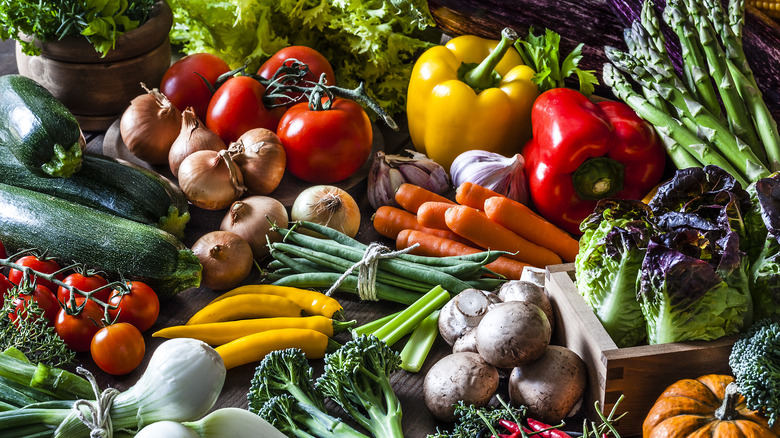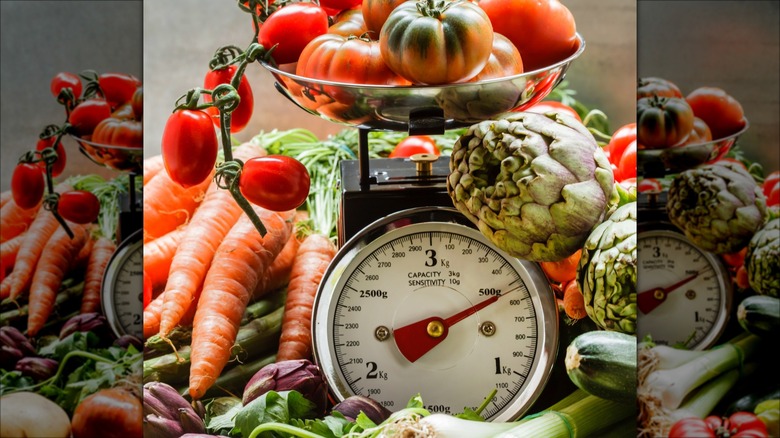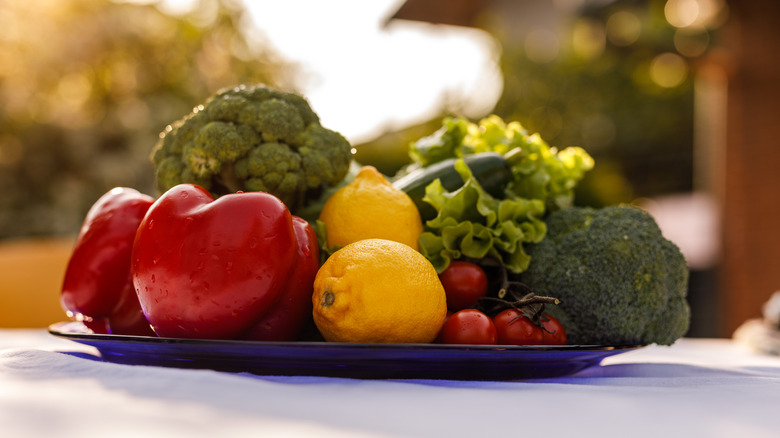Is It Possible To Eat Too Many Vegetables?
Consuming an abundance of vegetables, especially underrated vegetables that are overlooked, is often hailed as a healthy choice because of their rich nutrient content and potential health benefits. It's true — a diet rich in vegetables can provide benefits from lowering blood pressure to offering your body protection from cancer. However, like any good thing, too much can have its downsides. An excessive intake of vegetables can lead to various drawbacks, including digestive issues like bloating and gas, nutrient imbalances, kidney problems, and a higher risk of certain allergic reactions. Ideally, a balanced diet that includes a variety of vegetables, alongside other important foods like protein, grains, fruits, and healthy fats, is recommended.
An excessive amount of vegetables is considered as eating quantities well over the daily recommended intake. This could look differently based on individual situations: It could mean eating primarily leafy greens in every meal throughout the day or eating exclusively protein-rich vegetables to satisfy those nutrients. While the daily recommendation varies based on your age and weight, it remains true for everyone that overeating vegetables won't give your body anything extra it needs. In fact, eating only vegetables for a month or doubling the daily intake could end up harming your body in other ways. Here, we'll explore the potential issues you could face if you're eating vegetables almost exclusively, or in too high amounts on a regular basis.
Too much fiber could lead to digestive issues
Even though dietary fiber is essential for a healthy digestive system, an overabundance can lead to discomfort and gastrointestinal problems. Cruciferous vegetables, such as broccoli, cabbage, and cauliflower, are high in both soluble and insoluble fiber and can be hard to digest in large amounts. While insoluble fiber promotes regular bowel movements, excessive consumption can lead to bloating, gas, cramping, and other bathroom troubles, especially if you already have a sensitive digestive system, as noted by Healthline. This is because insoluble fiber does not dissolve in water and can be abrasive, causing irritation in the digestive tract. On the other hand, soluble fiber dissolves but too much of it can hinder your body's ability to absorb important nutrients and even medications because the fiber binds to them.
Moreover, fermentable fibers like fructans, which are found in vegetables like asparagus, leeks, artichokes, and onions, and galactans, which are present in broccoli and Brussels sprouts, can undergo fermentation in the gut, leading to gas and bloating, according to the Academy of Nutrition and Dietetics. If you have irritable bowel syndrome (IBS) or inflammatory bowel disease (IBD), you may be particularly sensitive to high-fiber vegetables, and it can end up exacerbating your digestive symptoms. Moderation in consuming fiber-rich vegetables, drinking plenty of water, and pairing high-fiber foods with other nutrient-rich options can help add more fiber to your diet while mitigating possible stomach discomfort.
An imbalance of nutrients can have negative effects
Vegetables are full of important nutrients that support our immune systems and overall health, but if you overeat vegetables, you can end up with an imbalance of nutrients or too many antinutrients. Yes, antinutrients are exactly what they sound like — nutrients that oppose other nutrients. Present in various foods, including vegetables, antinutrients are natural compounds that can hinder the body's absorption or application of nutrients, according to the Harvard T.H. Chan School of Public Health. Some common antinutrients found in vegetables include phytic acid, oxalates, glucosinolates, goitrogens, tannins, and lectins.
Cruciferous vegetables contain glucosinolates and goitrogens, which can interfere with how your body absorbs iodine, leading to possible complications with thyroid function. In vegetables like spinach, beet greens, and rhubarb, there are oxalates, which can affect calcium absorption. Healthline notes that lectins are higher in nightshade vegetables like tomatoes and eggplants and can prevent the absorption of zinc, iron, calcium, and phosphorus.
Aside from antinutrients that can cause an imbalance, eating too many vegetables can also potentially give your body too much of certain nutrients. For example, many leafy greens contain a large amount of vitamin K, according to Heathline. While this vitamin can aid in blood clotting and keep your bones healthy and strong, Cleveland Health explains that too much vitamin K2, in particular, can potentially be dangerous. Studies show it's very rare but possible to have a toxic level of the vitamin, and it could even have negative effects with medications that combat clotting, like blood thinners.
Some vegetables can negatively affect your gut health
Aside from the adverse effects of too much fiber, some vegetables can directly affect your gut health. This is because certain vegetables contain sulfite, alkaloids, mannitol, and fructose, all of which can contribute to stomach discomfort. Sulfites are sulfur-based compounds often used as preservatives in canned vegetables and vegetable juices, but also occur naturally in some vegetables, such as onions, garlic, and cabbage. They can cause bloating, gas, and even serious complications if you already deal with a sulfite allergy or sensitivity, per WebMD. A review in Digestive Diseases and Sciences, alkaloids, which are typically found in nightshade plants like tomatoes, potatoes, and bell peppers, can aggravate symptoms of conditions like irritable bowel syndrome (IBS) or inflammatory bowel disease (IBD).
Some vegetables, such as snow peas, contain both fructose and mannitol, which are naturally occurring sugars. According to Healthline, big reason why mannitol can be an issue is that it's a polyol. When foods rich in mannitol, such as mushrooms, cauliflower, and peas, are consumed, the polyols can act naturally as a laxative, potentially causing digestive trouble, per Food Insight. On the other hand, fructose is another kind of sugar found in mushrooms, snow peas, and asparagus that can adversely affect your gut health.
Overeating certain vegetables can cause kidney problems
Vegetables like spinach, broccoli, potatoes, and various cooked greens include potassium, an essential mineral that helps maintain proper muscle and nerve function, as well as the balance of our cells' fluid, according to Harvard School of Public Health. However, overeating potassium-rich vegetables can potentially lead to hyperkalemia, which means there are high levels of potassium in the blood. This can be harmful to the heart and muscles, including the muscles in the digestive tract, per Healthline. According to the Harvard School of Public Health, if your kidney health is already compromised, you're at risk for developing kidney stones or other complications with a high-potassium diet.
In addition, there are vegetables that contain phosphorus, which can affect the kidneys. According to Healthline, soybeans are particularly high in phosphorus, but other vegetables that contain it include asparagus and cauliflower. Oftentimes, phosphorus is found in higher levels in people with chronic kidney disease (via Harvard School of Public Health). It's especially important for people with advanced kidney disease to avoid excessively eating foods that are higher in phosphorus to protect their kidneys and prevent other health risks. Even if you don't have pre-existing kidney complications, it's wise to have a balanced intake of both potassium-rich and phosphorus-rich foods to give your body the steady support it needs.
You might consume too much pesticide
When you buy vegetables outside of local farmers' markets, there's a very good chance that they have residual pesticides. In fact, a category of food labeled "The Dirty Dozen" refers to foods with higher pesticide levels than others. While vegetables don't make up all 12, some do make the list. The Environmental Working Group (EWG) annually releases a list of foods with high traces of pesticides, provided by information given by the U.S. Department of Agriculture (USDA) and the Food and Drug Administration (FDA). This year's guide featured vegetables like spinach, kale, green beans, and bell peppers. In 2021, the USDA's Pesticide Data Program showed vegetables like celery contained pesticides and insecticides.
While the U.S. Environmental Protection Agency (EPA) regulates and evaluates the use of pesticides on foods, it isn't foolproof. There's cross-contamination within fields, plus the potential for overuse of pesticides or even a breeze carrying the spray too far. With even some residual pesticides, the risk remains. Pesticide residues in food have been associated with potential health risks, including disruptions to the endocrine system, effects on the immune system and reproduction, and even a possible link to certain cancers. Long-term exposure to low levels of pesticides is a concern, particularly for vulnerable populations like children, pregnant women, and anyone with compromised immune systems. Suffice it to say that eating vegetables that are known to be dirty in extreme excess can increase the risk of consuming higher levels of pesticides.
There's a bigger risk of allergic reactions
Most of us can handle eating vegetables just fine, but for some folks, eating too much of certain veggies might lead to allergic reactions or intolerances. In fact, Seattle Children's Hospital explains that vegetables and fruits cause allergic reactions more commonly than other foods, like shellfish or nuts. Oftentimes, allergic reactions related to vegetables are caused by oral allergy syndrome (OAS), which can affect your skin or stomach. The symptoms vary in severity and may manifest in a mild way, such as itching, swelling, or hives, or in a more severe way, such as difficulty breathing, chest tightness, or anaphylaxis. Common vegetable allergens include proteins found members of the nightshade and gourd families, according to the University of Nebraska's Institute of Agriculture and Natural Resources.
If you already suffer from seasonal or pollen-based allergies, a study published in Medicina shows you may be extra sensitive to some vegetables, especially when overeating them. For instance, if you experience ragweed allergies, you may also be affected by vegetables like cucumber, potatoes, and squash. Likewise, vegetables such as carrots, celery, and broccoli may increase allergic reactions if you deal with mugwort allergies. Aside from pollen-based allergens, some veggies are fermented, aged, or high in histamine naturally, like spinach and eggplant, and studies show this can provoke symptoms like headaches, skin rashes, and digestive issues in people with histamine intolerance. Continual exposure to allergens in vegetables, especially in excess, can potentially sensitize the immune system, making you more prone to allergic reactions over time.
It could lead to unintentional weight loss
Incorporating vegetables into your diet is a good idea, but if you're eating them exclusively or in excessive amounts, you run the risk of losing weight unintentionally and possibly harming your body. A big reason for this is the high dietary fiber content found in veggies. Fiber adds bulk to the diet without adding calories because it's not digested. When you consume a lot of fiber from vegetables, it can fill your stomach, giving you a feeling of fullness or satiety. This feeling of fullness may lead you to eat less or reduce your overall calorie intake.
It's true that vegetables provide high amounts of vitamins, minerals, and other essential nutrients per calorie. However, their low calorie content may not provide enough energy, just as the nutrients from vegetables alone might not be enough. Everyday Health notes that celery, asparagus, cauliflower, onions, lettuce, and cucumber are often considered "zero-calorie" or "negative-calorie" foods. However, eating primarily low-calorie vegetables can actually cause harm by causing an imbalance of nutrients. By giving you less overall nourishment, it increases your chance of unintentional weight loss. Instead of opting for all high-fiber, low-calorie vegetables, you should incorporate a healthy balance of vegetables, fruits, and protein-rich foods and drink zero-calorie beverages such as water.
It might cause dental issues
Some vegetables are acidic in nature. If eaten in excess, over time, acidic foods can erode tooth enamel, making your teeth more susceptible to decay and sensitivity. While fruits are known to be more acidic than other produce, some common acidic vegetables include tomatoes (which somewhat border the line between fruit and vegetable), pickles, and sauerkraut.
Additionally, sugar can also contribute to dental issues. According to the American Dental Association, added sugars such as fructose can cause tooth decay. Yet some vegetables naturally produce fructose, such as snow peas, zucchini, and asparagus. Even some vegetable-based juices can use fructose as an additive, which can potentially cause harm to your teeth. Furthermore, starchy vegetables like potatoes have a high glycemic index, per Healthline. As the National Institute of Diabetes and Digestive and Kidney Diseases (NIDDK) explains, an increase of glucose in your bloodstream or saliva can cause excess plaque, possibly leading to gum disease.
Your skin could become orange
If you've ever been told that eating too many carrots will turn your skin the shade of one, well... they're not entirely wrong. To explain, beta-carotene is a type of carotenoid, a group of pigments found in many fruits and vegetables — especially those that are orange, yellow, and green, like carrots, sweet potatoes, and winter squash. As Mount Sinai explains, beta-carotene is a precursor to vitamin A and is converted into vitamin A, which is great because it supports your eyes, skin, and immune health. However, when you consume more beta-carotene than your body requires, the excess is stored in the fatty tissues under your skin, giving you an orange or yellow tint, which is called carotenemia, as explained by Cleveland Health.
It's important to note that carotenemia is a benign and non-harmful condition, per a report in Cureus. The excess beta-carotene in the skin does not cause any health problems and will gradually fade once you reduce your intake of these specific foods. Nevertheless, if you want to avoid turning your skin a different color, you may want to create balance in your diet and avoid eating an excess of vegetables rich in carotene.
How many vegetables should you eat in a day?
The daily recommended portion of vegetables is dependent on the vegetable and how it's prepared. For example, according to the USDA, two medium carrots are equivalent to 1 cup of baby carrots, likely because of how they vary in size. However, 2 cups of fresh leafy greens like kale, mustard greens, spinach, and Swiss chard, is considered equal to 1 cup once the veggies are packed down. It's not always as difficult to discern — for the most part, 1 cup of cooked or fresh veggies equates to the cup needed.
On the other hand, serving sizes can be tricky to understand because most food items have different portions that are recommended. For vegetables, one serving typically looks like 4 to 6 ounces, per the Mayo Clinic. If 4 to 6 ounces is equal to 1/2 to 3/4 cups, then you're going to want to eat at least 2 servings of vegetables a day. Harvard Health suggests even more — around five servings of vegetables a day. But if doing that kind of math and conversion feels like a lot to understand, there are simpler ways to get the proper amount of vegetables.
According to the Centers for Disease Control and Prevention (CDC), around 2 to 3 cups of vegetables satisfy the daily recommended intake. Depending on how much you weigh and how old you are, the USDA recommends eating upwards of 4 cups of vegetables a day or making sure half of your plate is veggies. Any more and you won't be giving your body anything extra it needs.










